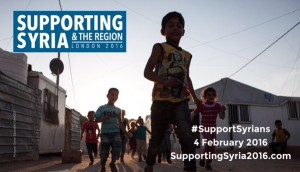4th February 2016 London, UK
Syria conference in London
As we approach the fifth anniversary of the civil war in Syria, the most urgent humanitarian catastrophe of the day continues with a quarter of a million lives lost to date. The international community must significantly step up its efforts and act now to support the 18 million people in Syria and neighbouring countries who are in desperate need of help.

[Today], the UK will co-host a conference, “Supporting Syria and the region 2016,” with Germany, Kuwait, Norway and the United Nations. It will take an ambitious new approach to provide longer term support for refugees: through concrete action on livelihoods and jobs, and improved access to education – giving refugees the skills they need for the future and the best chance of a successful return home.
The London conference will also seek to address the huge humanitarian challenges faced by the people of Syria, and raise significant new funding to meet the immediate and longer-term needs of those affected. The 2016 UN coordinated appeals for the Syria crisis call for US$7.7 billion. An additional US$1.2 billion in funding is required by affected regional governments hosting refugees.
The UK has been a leading force in attempts to address the situation in Syria, and the Prime Minister’s consistent focus has been on providing a comprehensive solution to the current refugee crisis, which deals with the root causes, rather than just responding to the consequences.
That means working with the international community to bring about an end to the brutal conflict in the country. The UK’s comprehensive strategy contains three strands, covering the political, military and humanitarian dimensions. Politically, the UK is deeply involved in the International Syria Support Group working towards a political transition to a peaceful future. Militarily, the UK contributes to the campaign in the region to defeat Daesh. And as the second largest bilateral donor after the US, pledging over £1.1 billion so far to Syria and the region to provide support such as food, shelter, medical care and clean drinking water for hundreds of thousands of people affected by the conflict, our humanitarian efforts have also been extensive.
Elsewhere, the generosity shown by neighbouring countries such as Jordan, Turkey and Lebanon has undoubtedly saved many lives and allowed people to stay close to home, avoiding perilous journeys towards Europe.
But we all need to do more. We must act to make a safer Syria now, with an eye on reconstruction for the future.
Syria and its people need more funding, more protection and more opportunities for the future. The international community has a responsibility to help more than four million refugees in neighbouring countries along with more than 13 million people in need of humanitarian assistance inside Syria. And the Syrian people, and those supporting them, need to know that the international community will support them beyond 2016
The conference in London will bring together global leaders, NGOs, the private sector and civil society to address some of the most pressing concerns raised by the crisis. It will seek to raise significant new funding to meet both the immediate and longer-term needs of those affected by the situation in Syria, and to support neighbouring countries. It will maintain pressure on all parties to the conflict to protect civilians and respect International Humanitarian Law. And it will identify ways to create jobs and provide education, offering all those who have been forced to flee their homes a greater hope for the future.
This will help pave the way for a broader discussion about how the international community responds to protracted crises in advance of the World Humanitarian Summit in Istanbul in May.
This event alone cannot solve the complex problems facing Syria, and a political solution remains necessary to end the conflict, but by continuing to shine a light on the abuses against innocent civilians we will ensure the people of Syria are not forgotten.
Nice..